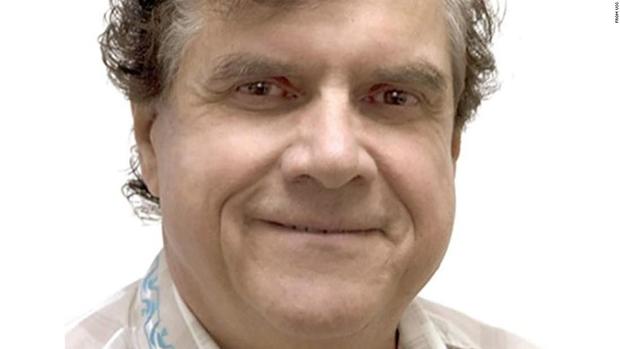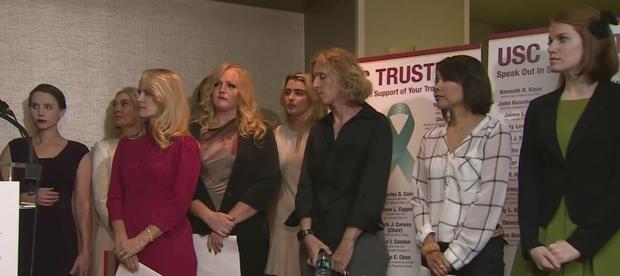USC Reaches $215M Settlement Over School Gynecologist Accused Of Sexual Misconduct
LOS ANGELES (CBSLA) – The University of Southern California has reached a $215 million settlement in principle on a class action lawsuit brought against a former longtime campus gynecologist accused of sexual misconduct by hundreds of patients.
The school announced Friday that it reached the settlement "to compensate students who received women's health services from Dr. George Tyndall at USC's student health center."
As part of the settlement, all class-action members will receive compensation of $2,500.
Those who are "willing to provide further details about their experience could be eligible for additional compensation up to $250,000," USC said in a news release.
Tyndall served as the only full-time gynecologist at the USC Engemann Student Health Center for nearly 30 years. In 2016, the school began investigating him over allegations of improper pelvic exams and making racist and sexually inappropriate remarks. Former colleagues had questioned his methods of pelvic exams, specifically, his practice of digital insertion before using a speculum.
Numerous women have stated Tyndall watched them undress and proceeded to violate them during pelvic exams.
USC didn't terminate Tyndall's employment until June 2017. The Los Angeles Times had been looking into Tyndall for months prior to the university's acknowledgment in May of this year that the school had been investigating him.
Since the revelation, hundreds of women with misconduct complaints against Tyndall have come forward and filed lawsuits against the school, claiming that USC tried to cover up his sexual abuse.
On Thursday, attorneys for 93 more patients filed lawsuits against USC, brings the total number of women who have accused Tyndall of misconduct to more than 400.
In a news conference Thursday at the Radisson Hotel in L.A., several women described their experiences with Tyndall.
"He took pictures of me while I was completely naked," Amanda Davis told reporters.
"I couldn't believe it when I found out that the LAPD had boxes of photos," said another woman.
"He molested me. He made me feel less than," another added.
As a result of the scandal, USC President C. L. Max Nikias officially resigned his position in August. Two longtime student health clinic administrators were also fired.
It is unclear how many of the more than 400 patients who have accused Tyndall of misconduct will be part of Friday's settlement for the class-action lawsuit.
The 71-year-old Tyndall, who has maintained his innocence, has never been arrested or criminally charged. However, the Los Angeles County district attorney's office is currently reviewing dozens of cases for possible sex-crimes charges.
"Our Board of Trustees supports this settlement, which was reached in collaboration with plaintiffs' counsel, and which will provide relief to those who have been impacted by this difficult experience," interim USC President Dr. Wanda Austin said in a statement.
Here is Austin's full statement on the settlement below:
Dear USC community,
As of October 19, 2018, the university has reached agreement in principle on a $215 million class action settlement that will compensate students who received women's health services from Dr. George Tyndall at USC's student health center.
Our Board of Trustees supports this settlement, which was reached in collaboration with plaintiffs' counsel, and which will provide relief to those who have been impacted by this difficult experience. By doing so, we hope that we can help our community move collectively toward reconciliation. I regret that any student ever felt uncomfortable, unsafe, or mistreated in any way as a result of the actions of a university employee.
The settlement provides all class members (former patients who received women's health services from Tyndall) compensation of $2,500. Patients who are willing to provide further details about their experience could be eligible for additional compensation up to $250,000. Following the expected court approval, all class members will be sent a notice of their options under the settlement in the coming months. In the meantime, I encourage impacted patients to check back regularly on this site (change.usc.edu/settlement) to remain updated on new information.
A fair and respectful resolution for as many former patients as possible has been a priority for the university and for me personally since I began serving in the role of Interim President. Many sweeping changes have been made and we continue to work every day to prevent all forms of misconduct on our campuses, to provide outstanding care to all students, and to ensure we have policies and procedures that prioritize respect for our students and our entire university community.
In reaching this settlement, I am grateful for the leadership of our Board of Trustees, and particularly for Rick Caruso, our board chair, for working diligently and leading us through this important time.
Today's announcement is an important step forward, but it is only the beginning of our journey. We care deeply about our community, we are listening carefully, learning from these experiences and strengthening our university.





